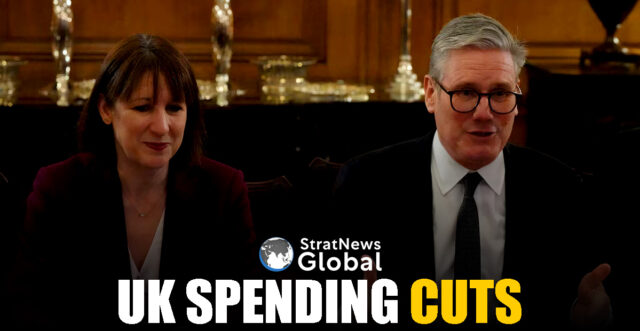On Wednesday, UK’s Finance Minister Rachel Reeves is expected to unveil cuts to her spending plans in an effort to reassure investors that she can be relied upon to address the country’s public finances as growth slows.
With Britain’s 2025 economic outlook set to be slashed – and borrowing costs in financial markets rising in recent days – Reeves has said she is ready to tighten the government’s belt to ensure it stays on track to meet its budget targets.
Reeves and Prime Minister Keir Starmer promised voters last year they would speed up Britain’s economy. But growth has tailed off and demands for spending have mounted, chief among them on defence as Europe braces for less U.S. protection.
Tax Hike To Cost Jobs
The Treasury said Reeves would announce 2.2 billion pounds ($2.9 billion) of extra spending for defence in the coming financial year, part of Starmer’s plan to raise defence spending to 2.5% of economic output by 2027.
“Our task is to secure Britain’s future in a world that is changing before our eyes,” Reeves is due to say in her fiscal update speech to parliament starting around 1230 GMT.
Reeves has already sought to pin much of the weak outlook to upheaval in the global economy, which is reeling from U.S. President Donald Trump’s import tariff plans.
But employers say a big tax hike – which comes into force next month – will cost jobs, push up prices and confound the government’s growth promises.
10,000 Public Sector Jobs Could Be Cut
This month, the centre-left Labour government announced plans to save around 5 billion pounds a year in spending on the sick and disabled, accounting for about half the estimated shortfall in Reeves’ budget strategy.
Media said Britain’s budget watchdog thought the welfare changes would save 1.6 billion pounds a year less than the government’s estimate, prompting Reeves to shave a further 500 million pounds off benefits and to make up the rest of the difference via slower rises in other public spending.
Reeves has also said that 10,000 public sector jobs could be cut and further savings might come from the accounting treatment of billions of pounds being diverted from overseas aid to the defence budget.
Some Labour lawmakers are alarmed about the cuts after years of squeezed spending for many areas of government under the previous Conservative government.
Growth Outlook Cut
The Office for Budget Responsibility, which produces the forecasts for the government’s budget plans, is expected to slash its forecast for 2% economic growth this year. The Bank of England last month halved its own forecast to just 0.75%.
Reeves points to the Organisation for Economic Cooperation and Development’s latest forecast for 1.4% growth this year, down from a previous 1.7% estimate but the second-fastest among the Group of Seven nations after the U.S.
Reeves has said overall day-to-day public spending will outpace inflation in the coming years but will be focused on priority areas.
She is determined to avoid a repeat of the debt market shock in 2022 after former Conservative Prime Minister Liz Truss said she would slash taxes without saying how her sums would add up.
British debt costs have climbed in recent days. Some investors are wondering how Reeves can meet her target of balancing day-to-day spending with tax revenues by 2030 with growth so weak.
Some Labour supporters have pointed to European Union plans for exemptions to its budget rules to allow more national spending on defence while Germany has relaxed its cap on borrowing as part of a major spending boost.
Paul Mortimer-Lee, a research fellow at the National Institute of Economic and Social Research, a think tank, said Reeves would eventually have to raise taxes again to stick to her targets.
“This is not rocket science. You can’t actually cut spending very much and there’s no mandate for that,” Mortimer-Lee. “The only way you’re going to fix it is raise taxes.”
Reeves and Starmer promised voters they would not hike income tax or other big revenue-raisers. But they could extend a freeze on the thresholds at which people start to pay basic and higher rates of income tax, dragging more people into the tax net.
($1 = 0.7727 pounds)
(With inputs from Reuters)





